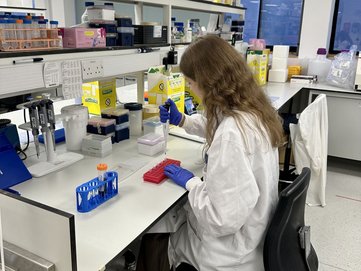Meet Jamie – the latest Lily-funded researcher to join our team working to better understand the complexities of mitochondrial disease. The work she’s about to embark on, as part of our new Precision Diagnostics Project, will be vitally important in securing a genetic diagnosis for patients.
Following in the footsteps of our previous Lily-funded researcher, Yasmin, PhD student Jamie has been working at the Wellcome Centre for Mitochondrial Research at Newcastle University since October with Professor Rob Taylor, Dr Charlotte Alston and Dr Monika Oláhová. She’s been busy getting accustomed to the lab, meeting new colleagues and learning new skills and techniques that will enable her to hit the ground running as soon as the project starts to deliver the data that requires her input.
Jamie’s passion for all things mitochondria was sparked at high school by an enthusiastic biology teacher. “I remember him doing a presentation on the powerhouse of the cell,” she recalls fondly, “and it just stuck with me.” Ever since then she’s wanted to be involved in research, and after a degree in Biomedical Sciences at Northumbria University she spent her Masters research placement studying novel disease genes at Newcastle University.
The perfect fit
So when the Lily role came up it was the perfect fit for her. “The more I read about mito, the fact that it’s so challenging for patients, and the fact that I could use what I really love and am skilled at, the more I wanted to do it. And learning about the charity inspired me. I wasn’t aware of how it first came about, but now that I know, I feel honoured to be in this position.”

The innovative project that Jamie’s working on will use sophisticated technologies which sequence lots of genes at the same time to try and pinpoint where the error is. This initial sequencing will take place in London, but if there’s a genetic change that needs to be then taken into the lab to actually see whether it is indeed that change which is causing the problem, that’s where Jamie’s role comes in. The aim is to build a library of evidence so the team can say without any doubt which sequence change is causing the problem.
Jamie’s looking forward to getting stuck into her new role. “This is exactly what I’ve been doing for my Masters,” she says, “but I’ll just be translating it to another area of disease pathology. I’m grateful to have this opportunity, and I’d love the chance to go to some of the Lily events too. The idea of meeting patients and families is really important, so I’d definitely like to get involved in anything I can.”
Understanding the challenges mito patients face
Rare Disease Day this year takes place on the 29th February, and Jamie’s very aware of the challenges faced by those affected by rare diseases such as mito. “We’re in this bubble here at the Wellcome Centre where everyone knows about mito,” she explains. “But then I go home and it just isn’t on the radar of any of my family or friends. It’s incredibly hard for a healthy person to appreciate how different someone’s everyday life might be, and having people who understand the difficulties they face is really important.”
“Having that understanding and that support network is one of the most important things, but the not knowing is a big thing too,” she continues. “For many of us, if we’re poorly we go to the doctor and get sorted. That’s not the case for mito patients, and there’s not a quick fix or an answer available. So filling that information gap and providing an accurate genetic diagnosis allows families to have that knowledge and use that information in important ways around things like reproductive options.”
Jamie’s also keen to inspire the next generation in the way her biology teacher inspired her. “I’d love to go back to school and spread the word about what I’m doing,” she says. “My partner’s a teacher, and the school want me to come and talk to some of the students, so I’m already thinking about that. It’s never too early to see what’s possible and who you might inspire.”
We completely agree, because spreading the word about mito is essential as we search for treatments and a cure. But first for Jamie is a very important part to play in our diagnostics project. And we wish her, and the rest of the team, the best of luck as they make a start analysing some of that genetic data.
Help support mitochondrial research
This Rare Disease Day, why not make a donation to help support life-changing research and improve the lives of everyone affected by mitochondrial disease? The Lily Foundation are the largest charitable funder of mitochondrial research in Europe, with over £3 million invested to date, but we can only continue our work with your support.

